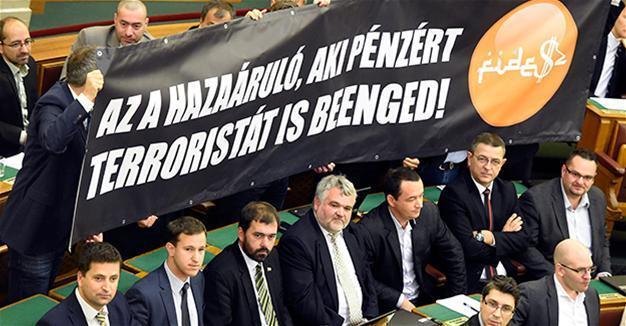Hungary MPs block PM’s bid to bar refugee resettlement
BUDAPEST

AP photo
Hungarian lawmakers on Nov. 8 blocked Prime Minister Viktor Orban’s bid to change the constitution to bar the resettlement of refugees, after the radical right Jobbik party refused to support the bill.
While all 131 MPs of Orban’s ruling right-wing coalition voted in favor, the bill failed to pick up an extra two votes to reach a required two-thirds majority.
The surprise rejection is a rare setback for the populist strongman who is used to getting his way since winning a supermajority in 2010 and reelection in 2014.
The anti-immigration Jobbik party had been a natural ally on the issue of barring large-scale resettlement of refugees, but laid a surprise ambush for Orban earlier this month.
Spotting a rare opportunity for leverage, Jobbik’s leader Gabor Vona announced they would vote for the bill only if the government scrapped a controversial cash-for-residency bond scheme for wealthy foreigners, particularly from Russia, China and the Middle East.
Jobbik said the scheme posed a national security risk that could be exploited by jihadists.
Orban was caught off-guard by the ultimatum and initially said he would “consider” Vona’s gambit, but later told parliament that the government “would not give in to blackmail.”
After the Nov. 8 vote, Jobbik MPs held up a banner: “The traitor is he who lets in terrorists for money,” with the Fidesz logo in Arabic style font.
The parliamentary ballot follows a divisive referendum on Oct. 2, in which 3.3 million voters backed Orban’s rejection of the European Union’s refugee quota plan.
That ballot, however, was deemed invalid due to low turnout in the nation of nearly 10 million people.
Orban personally submitted a draft amendment to parliament the week after the referendum, proposing a ban on migrant settlement without the approval of the national assembly and authorities.
“Foreign populations cannot be settled in Hungary,” the amendment reads. Individual foreigners (not including EU nationals) can only live in Hungary with the approval of Hungarians, it continues.
